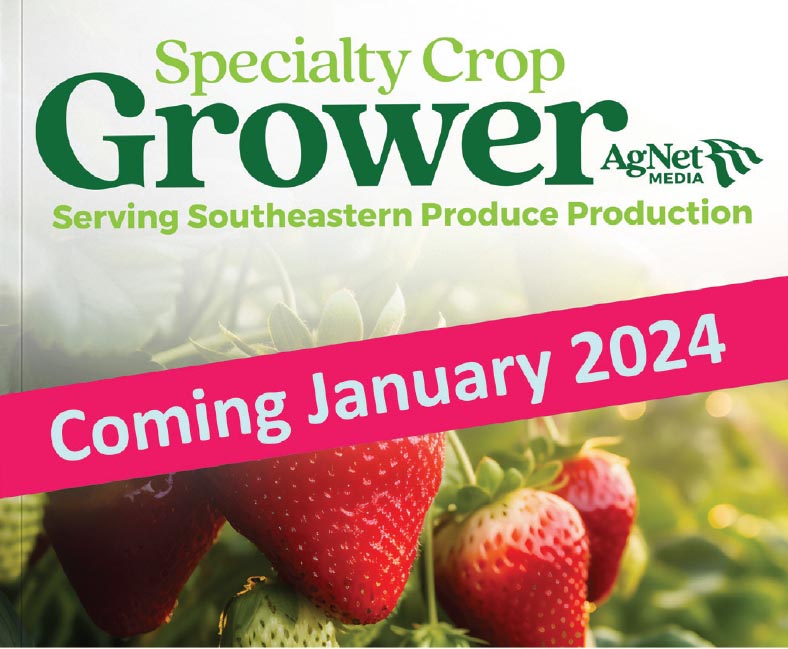
By Frank Giles
This year has been a busy one for specialty crop growers and flew by as we flip the calendar to welcome 2024. The new year will surely be as busy and includes an exciting change here at AgNet Media.
Introducing Specialty Crop Grower
Beginning in January, AgNet Media will merge two of its magazines. Specialty Crop Industry and Florida Grower will combine to form Specialty Crop Grower. This merger will better serve you with timely production, market, financial and policy articles you need to be successful producing a crop.
Specialty Crop Grower will take the combined legacy of Specialty Crop Industry, which was founded in 2018 as Vegetable and Specialty Crop News, and Florida Grower, which has been in publication for more than 116 years. Quite a few of you probably received Florida Grower in addition to this magazine.
Rest assured, we will continue to provide coverage of key happenings in Florida, as well as in Georgia, Alabama and the Carolinas. Specialty Crop Grower’s mission is to serve Southeast produce production.
Farm Bill at the Forefront
There will be a lot happening next year, including continued work on a new farm bill. The current farm bill expired at the end of September. The current bill was extended for a year, so 2024 will see a lot of debate on the farm bill front.
So, we’ll be keeping close tabs on the farm bill and reporting how it will impact your business going forward. There are many legislative asks being made, but the big push from the specialty crop sector is more representation in the next bill.
After all, if half of the U.S. Department of Agriculture’s (USDA) own food plate of daily recommended servings is made up of fruit and vegetables, surely the growers of those crops should have a larger stake in the farm bill. Historically, the bill has been dominated by row crops, but the specialty crop sector is fighting for a larger slice of the pie, or plate as they say.
While several issues impact farm profitability, key among them is labor. We all know the struggle it has been to source labor and the challenges presented by the H-2A program.
We talk a lot about technology and automation that could help replace the lack of workers on farms. While there has been a good deal of progress made, we are still a long way off from robots roaming fields picking crops on a wide-scale basis.
So, an argument for this farm bill has been that if policymakers can’t deliver a workable immigration solution to source labor, there at least should be more investment aimed at research to develop technologies that can help fill the labor void.
While row crops have long dominated past farm bills, specialty crops have made inroads in recent iterations of the legislation. A key priority of the new bill is recognition of the unique characteristics of fruit and vegetable production.
One area of focus is the adjusted gross income (AGI) means test, which often limits specialty crop growers. The current implementation of AGI limitations disproportionately prohibits specialty crop producers from participating in certain USDA programs in a meaningful way and potentially precludes these growers from disaster programs.
The Specialty Crop Farm Bill Alliance (SCFBA) is working with lawmakers to seek more flexibility when it comes to the AGI. The SCFBA suggests that if the AGI continues to be utilized as a means test for specialty crop producers, it should revert to the 2002 farm bill model, which was used for the Coronavirus Food Assistance Program. If 75% or 90% of income is derived from farming, then no AGI limitation should be applied.









